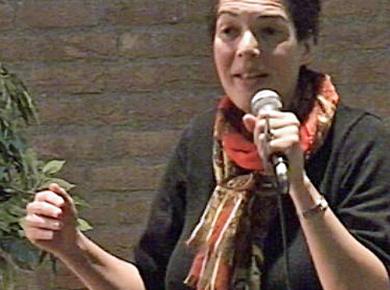Posted: February 3, 2015
Almere, Netherlands – Some 30 years ago the Dutch Mennonite Mission Board (DZR), which had been exclusively oriented toward foreign lands, began a missionary project on its own soil. This decision was motivated by an awareness of the increasing secularization of Dutch society.
This led to the start of a project in a new town called Almere, which was originally built to solve the housing problems in and around Amsterdam. The DZR established a house of hospitality in a neighbourhood located close to Almere’s developing city center. This drop-in centre, called Inloophuis de Ruimte, aimed to have an open door and a low threshold.
It was to be a place where people could easily and genuinely meet with one another – no simple task in a new city like Almere, where everyone is a relatively recent “immigrant.” At Inloophuis de Ruimte, these ordinary moments of meeting together are honoured as something holy, something through which the Spirit can and does work.
The DZR intentionally chose to open a drop-in center rather than to pursue more traditional missionary methods. On one hand, the centre is an outreach program and, on the other hand, it is also a learning experience for the Dutch Mennonites in order to provide tools that enable Mennonite congregations to relate to the “world” around them.
In November 2014 this joyful event was commemorated with a conference meant to cast a thankful but critical eye over the past 25 years and look ahead in hope.
The conference was not just attended by Dutch Mennonites, but also by workers from other Urban Mission centers and workers from local health care and welfare agencies as well as by members of other denominations.
In presentation, Stuart Murray, an Anabaptist theologian from the United Kingdom drew a picture of the changed position of churches in society – a shift from being at the margins rather than at the centre. He encouraged churches to show greater readiness to partner with others, rather than acting independently or trying to control everything.
Churches should also be clear about their motivation – social engagement as valuable in itself, not as a cover for trying to convert people. Finally, churches should show greater insistence on being explicit about their Christian basis and the way in which their convictions undergird their activities.
He encouraged local councils and agencies to move beyond suspicion and welcome churches as partners in initiatives that can meet social needs and engage effectively in local communities.
Secular partners, he said, should accept that Christians are motivated by their faith and need not hide or apologize for this, but that this does not mean they will use their activities as a cover for proselytizing.
In the second presentation Andries Baart outlined the “presence approach” practiced in urban mission work in the Netherlands. In this approach, he said, the focus is on cultivating caring relationships rather than on problem-solving. “Try to stay close to people and always focus on people and never write people off,” he maintained.
Baart also pleaded that we acknowledge the apparent vulnerability of women and men in society. And he proposed that the Care System should operate in a reflective and relational manner at all times as care givers and the cared-for remain in dialogue about their care.
The conference attracted mainly two groups of visitors: church-related and non-church related, such as social workers and health care workers.
From an article by Gerrit Jan Romeijn

Comments: